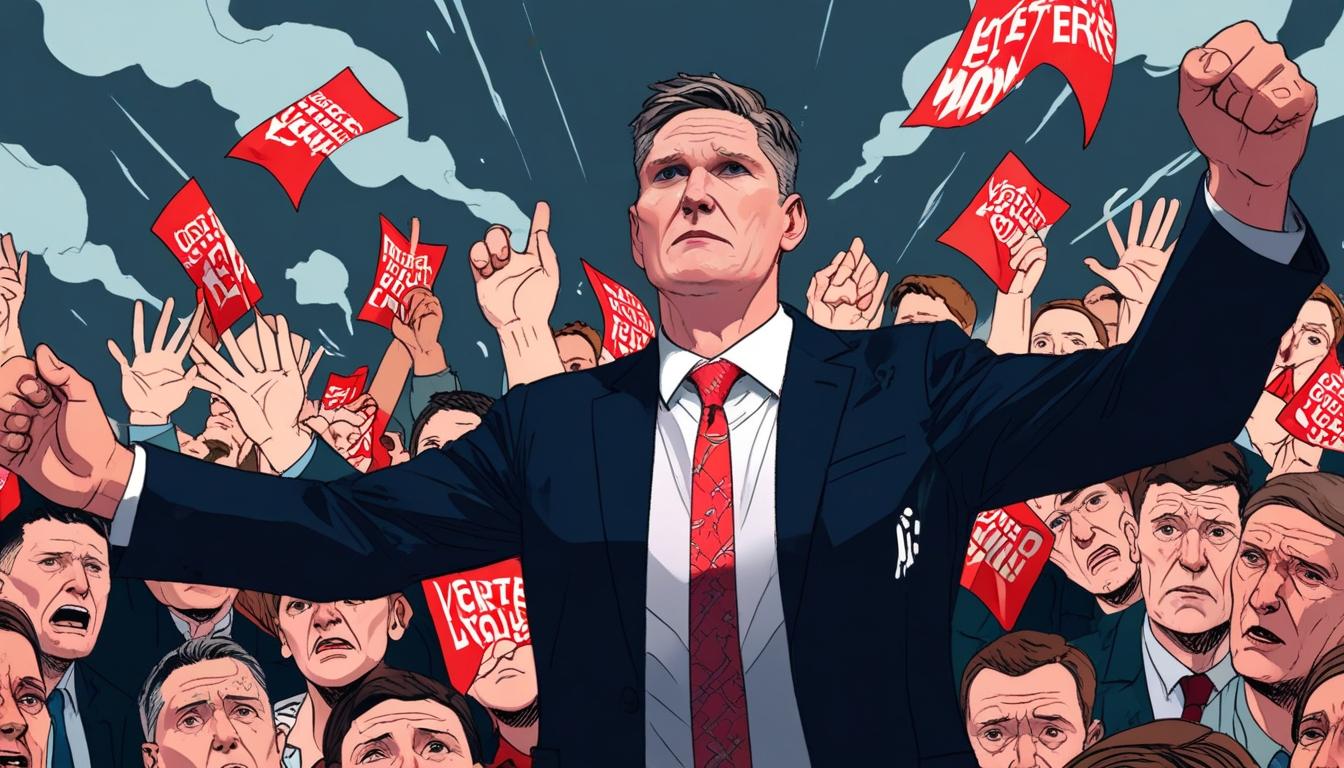Despite Labour’s landslide win in 2024, polling reveals significant voter regret and dissatisfaction with Keir Starmer’s leadership, highlighting growing disconnect over key issues like the cost of living, immigration, and public services. Emerging right-wing alternatives now threaten the party’s dominance.
Recent polling indicates a troubling shift in the public perception of Labour and its leader, Keir Starmer, as nearly a third of Labour voters reportedly regret their electoral choice in the 2024 general election. This regret, surfacing despite Labour’s landslide victory, highlights the party’s growing disconnect with the electorate. While 64% of Labour supporters initially backed their vote, this is significantly lower than the approval ratings among Conservatives and Liberal Democrats, standing at 83% and 81%, respectively.
The poll suggests that Labour is woefully out of touch with pressing societal issues, as a substantial 62% of respondents feel the party does not adequately grasp the ongoing cost of living crisis. Further underlining this disconnect, 58% of voters believe Labour is misreading immigration sentiments, while majorities express dissatisfaction with the handling of housing, employment, and healthcare matters. Alarmingly, 49% of voters feel the government is misjudging public transport issues, an area that has become increasingly critical under Starmer’s leadership. Ali Rehman Malik, Chairman of IRR International, called this polling an urgent wake-up call for Labour, remarking that it should prompt an urgent reassessment of priorities to regain the trust of nearly a third of its own voters.
Dissatisfaction with Starmer complicates Labour’s standing further. An Ipsos survey conducted in late 2024 revealed a stark 61% of respondents dissatisfied with his performance, marking his lowest approval rating to date. Even within his party, only 54% of Labour supporters report satisfaction, reflecting a concerning drop and mirroring a broader trend of economic pessimism where 65% of the public expect a worsening economy.
The analytical landscape reveals troubling dynamics for Labour. Pollsters significantly overestimated Labour’s support during the election, marking a vote share at just 34%—the lowest for a governing party in over a century. This discrepancy suggests a profound erosion in public confidence not only in Labour but in the broader political establishment, underlining the urgency for alternative voices.
Emerging support for right-wing alternatives highlights Labour’s vulnerabilities. In October 2024, disillusioned voters from previously Conservative strongholds, who had switched allegiance to Labour, began expressing regret over their choice, particularly in response to Starmer’s proposed tax increases aimed at addressing economic pressures. The resultant sentiment has driven a noteworthy decline in Labour’s poll ratings. A YouGov poll from February 2025 underscored this trend, revealing that a right-wing party focused on reform had surpassed Labour in popularity for the first time—a clear signal of the discontent simmering within the electorate.
Starmer’s waning popularity further compounds Labour’s challenges, particularly due to several unpopular policies, such as cuts to energy benefits for retirees and a controversial two-child limit on family allowances. Adding fuel to the fire, a public scandal—dubbed ‘Frockgate’—involving gifts received by Starmer and his associates has further tarnished the party’s credibility.
In light of these developments, Labour stands at a critical juncture, where immediate and decisive action is paramount. The current political climate demands urgent introspection and adaptation within the party to not only reconnect with its disillusioned electorate but also to confront the multifaceted challenges posed by emerging alternatives keen on embracing change and addressing the real concerns of the public.
Source: Noah Wire Services
- https://www.express.co.uk/news/politics/2053425/keir-starmer-humiliation-damning-poll – Please view link – unable to able to access data
- https://www.ipsos.com/en-uk/dissatisfaction-starmer-reaches-61-his-highest-labour-leader – A November 2024 Ipsos survey revealed that 61% of Britons were dissatisfied with Keir Starmer’s performance as Labour leader, marking his lowest approval rating. The government’s overall dissatisfaction stood at 70%, with 65% of respondents expecting the economy to worsen in the next year. Among 2024 Labour voters, 54% expressed satisfaction, while 39% were dissatisfied. This data highlights growing public discontent and economic pessimism during Starmer’s tenure.
- https://www.telegraph.co.uk/politics/2024/08/28/pollsters-labours-support-general-election-vote-share/ – An August 2024 analysis revealed that pollsters overestimated Labour’s support by 4.2 percentage points in the general election, marking the largest margin in 50 years. Despite a landslide victory, Labour’s vote share was just 34%, the lowest for a governing party since World War I. The Conservatives’ vote share was underestimated by 2.9 percentage points, indicating significant discrepancies in pre-election polling predictions.
- https://yougov.co.uk/politics/articles/50245-keir-starmers-net-favourability-drops-nine-points-from-mid-july-2024 – A YouGov poll from mid-July 2024 indicated a decline in Keir Starmer’s net favourability among Britons, dropping nine points from mid-July. While 79% of 2024 Labour voters held a favourable view of Starmer, this was an eight-point drop since the election. The poll also highlighted increased negativity towards Starmer from Conservative voters, with 78% holding a negative view, despite a seven-point increase in positive opinions since the election.
- https://www.reuters.com/world/uk/voters-former-conservative-heartland-regret-backing-uk-pm-starmer-fear-tax-hikes-2024-10-24/ – In October 2024, voters in South West Norfolk, who supported Labour in the general election, expressed regret over their decision. Concerns centered around potential tax hikes and the government’s austerity measures ahead of the upcoming budget. Prime Minister Keir Starmer’s plans to increase taxes for the wealthy to address economic strains were met with skepticism, leading to a decline in Labour’s poll ratings and a shift in voter sentiment.
- https://www.reuters.com/world/uk/uks-right-wing-reform-party-leads-first-time-new-poll-sky-news-reporter-says-2025-02-03/ – A February 2025 YouGov poll indicated that Nigel Farage’s right-wing Reform UK party had overtaken the Labour Party in popularity, with 25% of voters supporting Reform UK compared to 24% for Labour. This shift reflects public dissatisfaction with Prime Minister Keir Starmer’s leadership, including challenges like a tax-raising budget and economic sluggishness. Farage’s populist views, particularly on reduced immigration and lower taxes, have contributed to his party’s rising support.
- https://www.lemonde.fr/en/international/article/2024/09/25/uk-prime-minister-keir-starmer-s-popularity-is-plunging_6727193_4.html – A September 2024 survey reported a significant decline in Prime Minister Keir Starmer’s popularity, with a 26% approval rating. The drop was attributed to unpopular policies, including cuts to retirees’ energy benefits and maintaining a two-child cap on family allowances. Additionally, controversies like the ‘Frockgate’ scandal, involving gifts received by Starmer and his associates, have fueled public discontent, further eroding the government’s credibility.
Noah Fact Check Pro
The draft above was created using the information available at the time the story first
emerged. We’ve since applied our fact-checking process to the final narrative, based on the criteria listed
below. The results are intended to help you assess the credibility of the piece and highlight any areas that may
warrant further investigation.
Freshness check
Score:
9
Notes:
The narrative references polling data and events through early 2025, including a YouGov poll from February 2025 and political developments described as recent, indicating very up-to-date content. There are no indications of recycled news or dated references. The situation described is fresh and ongoing, with no apparent reuse of older material.
Quotes check
Score:
7
Notes:
The only direct quote is from Ali Rehman Malik, Chairman of IRR International, who calls the polling an urgent wake-up call. No earlier sources for this quote were found online in the search, which could indicate it is an original or first publication of this statement, adding authenticity. However, the scarcity of other direct quotes limits comprehensive verification.
Source reliability
Score:
6
Notes:
The narrative originates from a UK tabloid publication known to publish timely political commentary but with a mixed reputation regarding sensationalism and depth. While it can be seen as a legitimate news outlet, it is not among the most authoritative or widely respected sources like BBC or Reuters, resulting in moderate reliability.
Plausability check
Score:
8
Notes:
The claims about Labour’s polling decline, voter regret, Starmer’s unhappiness ratings, and the public’s reaction to policy decisions align with plausible political trends seen in UK politics. The involvement of Ipsos and YouGov polls adds credibility. While some references like the ‘Frockgate’ scandal lack external verification here, the overall political analysis and polling data are credible and plausible.
Overall assessment
Verdict (FAIL, OPEN, PASS): OPEN
Confidence (LOW, MEDIUM, HIGH): MEDIUM
Summary:
The narrative is current and largely plausible, supported by recent polling data and political context up to early 2025. The direct quote appears original but lacks multiple source corroboration. The publication’s moderate reliability advises cautious acceptance of the claims. Overall, the content is credible but would benefit from verification via more authoritative outlets for a higher confidence rating.













